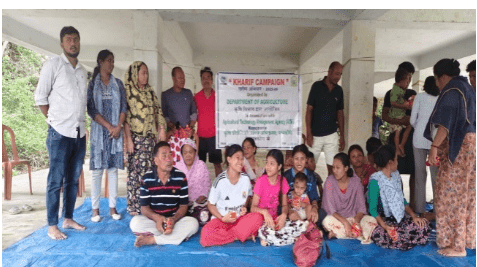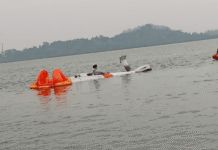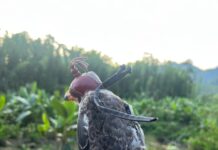Sri Vijaya Puram: As monsoon clouds hovered over the archipelago, a different kind of momentum gathered across the fields and community halls of the Andaman & Nicobar Islands. The Kharif Campaign 2025, spearheaded by the Union Territory Agriculture Technology Management Agency (UTATMA) in collaboration with the Department of Agriculture, was launched across Mayabunder, Car Nicobar, and Nancowrie blocks, bringing farmers together for a comprehensive push towards smarter, sustainable farming.
Part awareness drive, part skill workshop, and part policy interface, the campaign focused on more than just this year’s sowing season. It aimed to realign farming practices with ecological realities, introduce low-cost innovations, and ensure that even farmers in the remotest corners are informed about the schemes they are entitled to.
At Pudumadurai Community Hall, Mayabunder, the session was inaugurated by PRI member Dhanveer, who emphasized the role of informed cultivation in improving both yields and livelihoods. Farmers from the region participated in sessions that covered not just sowing calendars but also topics like the importance of Soil Health Cards, water-efficient methods, and the integration of organic inputs like Neemastra and Jeevamrith.
In Car Nicobar, the campaign found resonance at the Community Hall in Kakana village, where the 2nd Headman, Emmanuel, and Village Secretary Edward addressed the gathering. Both local leaders encouraged their farming community to adopt scientific methods while continuing to honour traditional knowledge systems. In these regions where community bonds are strong, local endorsement plays a crucial role in adoption.
Meanwhile, in Sanuh Village, Nancowrie, the campaign was hosted at the local community hall and guided by 3rd Captain Taufique Ahmed. Sessions here focused on weather-linked cropping decisions, vermicomposting, and the importance of diversifying income through allied activities like beekeeping.
One of the campaign’s key elements was familiarising farmers with the flagship schemes of the Government of India, including the Pradhan Mantri Fasal Bima Yojana (PMFBY) and the Kisan Credit Card (KCC). Officials explained enrolment procedures, claim processes, and the importance of timely registration. Schemes under Minor Irrigation, HVADA, and other allied sectors were also introduced to improve access to inputs and infrastructure.
In addition to lectures, field-level demonstrations brought concepts to life. A notable highlight was the hands-on session on vermicomposting using vermibeds at the farm of Laxmi Kanta Halder in Subhash Gram, Diglipur. The demo showed how kitchen waste, cow dung, and simple bedding material can be transformed into nutrient-rich compost. The event was attended by Ward Member Sumati Roy, who later described it as “a step towards self-reliant farming.”
Meanwhile, in Nabagram Village, a separate training program on Freshwater Fish Pond Management was organised in partnership with the Department of Fisheries. Hosted at the Community Hall and attended by Sarpanch Nirodh Mondal, the session helped farmers understand water quality monitoring, pond preparation, and fish feeding routines, encouraging diversification in farming portfolios.
What tied all three blocks together was the interactive nature of the campaign. Farmers asked questions ranging from crop insurance to pest-resistant seeds. Officials responded not with jargon but with field-ready suggestions, often supported by visual aids or live demos.
As the sessions wrapped up, one farmer from Nancowrie reflected, “The campaign made me see farming as more than a routine, it’s a system, and we are learning how to manage it better.”
While the rains will determine how the kharif season unfolds, this campaign may have already planted something deeper, confidence, connection, and the clarity that sustainable farming is as much about knowledge as it is about soil.





